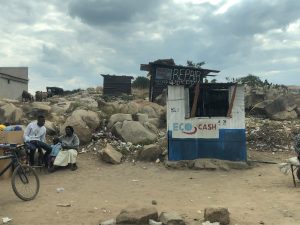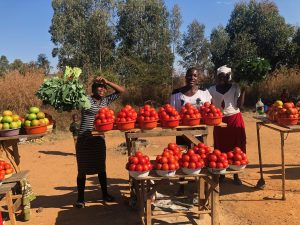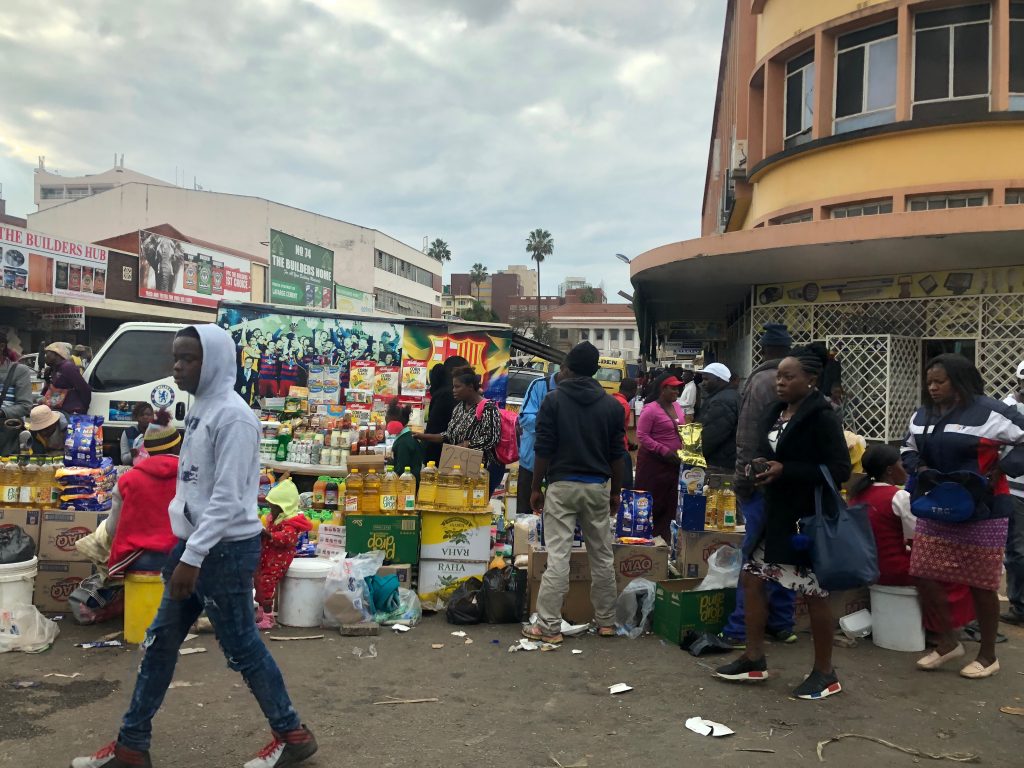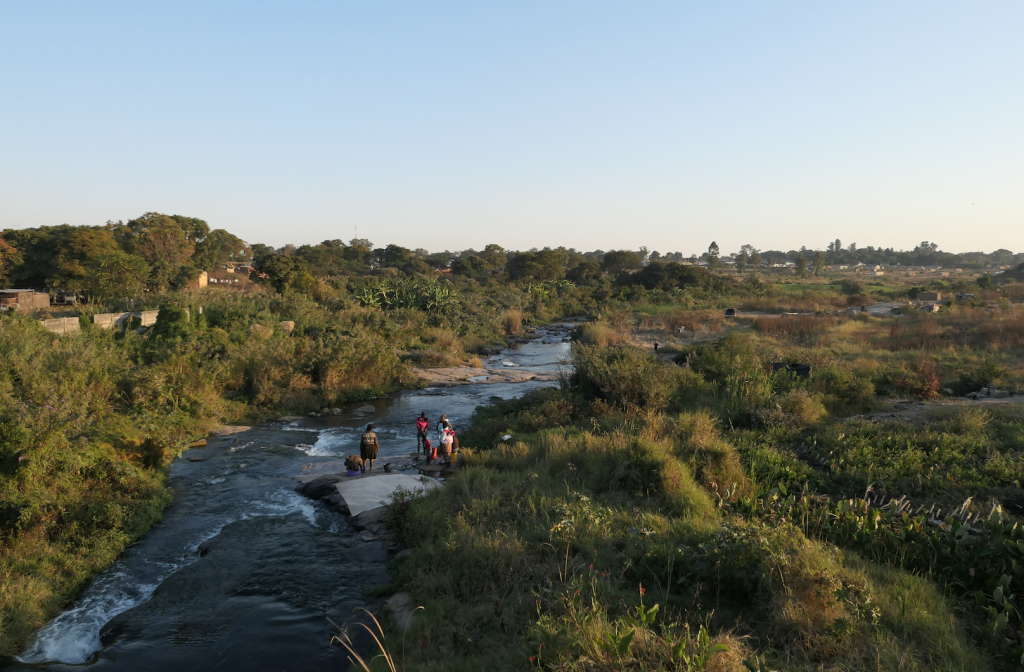Walk through Harare’s tourist markets today and you’ll see baskets full of million-dollar Zimbabwean bills being sold as souvenirs. Zimbabwe is often cited as a textbook example of hyperinflated currency. In the late 2000s, prices on Zimbabwean goods doubled every 24 hours and monthly inflation peaked at 7.9 billion percent. There was no food on supermarket shelves; people recall lining up all day to purchase a single loaf of rationed bread.
“A hundred trillion would buy three eggs,” a woman in Harare told me. “If you wanted to pay school fees for your children, you had to go to the school with a wheelbarrow full of money.” This period devastated Zimbabwe’s economy. Between 2000 and 2008, the national GDP decreased by 50%. It was the largest recorded decline in a peacetime economy.
In 2009, the country abandoned the Zimbabwean dollar and began using a range of foreign currencies, showing a clear preference for the US dollar. While this change ended off-the-charts inflation rates, it did little to revive the troubled economy. A lack of foreign investment and massive trade deficits still led to chronic cash shortages.
“During the 2008 crisis, everyone had cash, but there was nothing to buy with it. Now there are things to buy, but no one has cash,” a Harare man told me. In order to address the liquidity crisis, the central bank introduced bond notes, which are supposedly equivalent to the US dollar, but they are worthless outside Zimbabwe and have already depreciated to 1.60 to the dollar.
This lack of cash has a tremendous impact on daily life. On the streets of downtown Harare, you can see long lines of people waiting outside banks in the hope of withdrawing money from the ATM. In the last year, banks put a $40 weekly cap on withdrawals. But even with this restriction in place, there is no guarantee that any cash will be left by the time one reaches the front of the line. Some people arrive at 3:00 AM and wait outside all night to ensure that they will be able to withdraw currency before supplies run out.
Despite this hardship, Zimbabweans have developed resourceful solutions to cope with cash shortages. Econet Wireless, the country’s largest cellular network, launched EcoCash, a mobile wallet technology that acts as a substitute for cash. EcoCash allows customers to transfer money and complete transactions from their mobile phones. It’s not uncommon to see a street vendor pushing a cart of bananas hung with a handwritten cardboard sign reading “20 cents. EcoCash accepted.”
Unfortunately, despite these innovations, the currency shortages, coupled with a lack of foreign investment, have taken a serious toll on Zimbabwean industry. The nation’s unemployment rate is reported to be over 85%.
During June and July 2018, The Woman Advocacy Project (WAP) conducted a needs assessment in which we interviewed 136 women and girls in the communities where WAP works. The vast majority of adult women we interviewed reported that they were not working. Many said that instead of working in a steady capacity, they were supporting themselves through “Kiya Kiya”—a Shona idiom that means “forcibly unlocking,” i.e., forcing an opportunity to appear where there is none. The phrase is commonly used to describe the process of finding small jobs in order to earn some money by the end of the day.
Indeed, while very few people are employed in the formal economy, the streets of Harare are abuzz with informal economic activity and lots of “Kiya Kiya.” Tree trunks are crowded with hand painted signs advertising thatching services, tree cutting, key making, and iPhone Repair. Vendors display neat piles of bananas, tomatoes, oranges, avocados, sugar cane, roast corn, peanuts, and fresh vegetables on the roadside. Sidewalks and intersections are crowded with people peddling second hand clothes, plastic flowers, flags, firewood, stone, cement, wicker furniture, handmade brooms, cooking oil, sodas, decorative vases, and newspapers. In my time in Harare I’ve seen everything from teddy bears to plaster Corinthian columns to gravestones for sale on the side of the road.
Even with all this “Kiya Kiya,” most of the women WAP interviewed are struggling to support themselves and their families. Many had friends and relatives who left the country to seek opportunities and employment elsewhere. Today, almost a third of Zimbabweans live abroad, the majority of them in South Africa. More than 100 buses leave for Johannesburg each day from Harare’s bus terminals alone.
In my next post, I’ll discuss how this economic crisis impacts women, pushes girls out of school, and increases rates of child marriage.
Posted By Alexandra Kotowski (Zimbabwe)
Posted Jul 26th, 2018







4 Comments
Ali
July 30, 2018
Alex, thank you for sharing. The economic situation in Zim right now is very interesting and this post helps me to visualize how it is operating. Keep up the great work!
Princia Vas
July 30, 2018
I didn’t realize how bad the economic situation in Zimbabwe was until I read this post. Hopefully the situation will change for the better after the elections 🙂
Corinne Cummings
July 30, 2018
Hi Alex, thank you for the detailed blog post. You were extremely thorough in your facts and information — I am very impressed. I did not know the extent of Zimbabwe’s economic crisis…it was shocking for me to read. I am interested to see in your next blog post how this economic crisis consequently impacts girls/young women by means of pushing them out of school and increasing the rates of child marriage. I am curious if boys/young men are affected as well, or if females are the primary targets of Zimbabwe’s economic crisis. You are doing a lot of fantastic work, Alex. I am looking forward to learning more from you. The information that we are all learning from your blogs is phenomenal. Good luck with the last few weeks of your journey. Take care. Best, Corinne
iain
August 12, 2018
OK, so the economic crisis is partly to blame for child marriage. What role does this point to for WAP and other small NGOs, which have no money and cannot do anything about the larger economy and job creation? There’s obviously a lot going on in the informal sector – kiya kiya . So is that where WAP can make a difference? Really interested to know what solutions you and WAP going to propose to this economic challenge…..